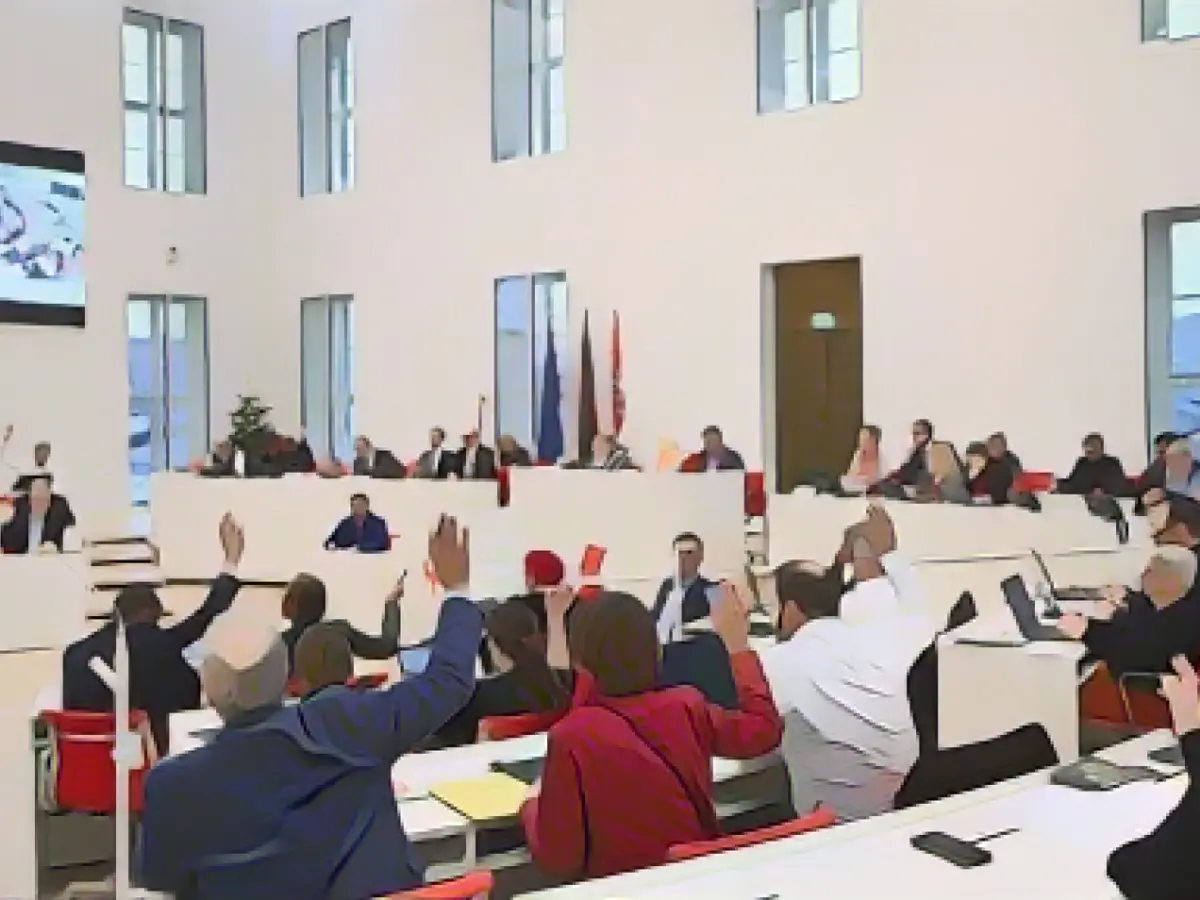Parliament - RBB state treaty adopted in Berlin and Brandenburg
The new RBB state treaty between the states of Berlin and Brandenburg can come into force. Both state parliaments approved the agreement by a majority on Thursday.
Among other things, the state treaty is intended to strengthen the RBB supervisory bodies and introduce duties of care and liability rules for decision-makers. The director's salary will be capped and unilateral actions by the directorate are to be prevented. The changes are a consequence of the scandal surrounding allegations of nepotism and waste that RBB fell into in the summer of 2022.
In the Brandenburg state parliament in Potsdam, the parliamentary groups of the governing parties SPD, CDU and Greens approved the draft. The AfD and Free Voters rejected the paper, while the Left Party abstained. In the Berlin House of Representatives, the coalition parties CDU and SPD voted in favor. The AfD voted against, the Left and the Greens abstained.
The agreement is set to come into force on January 1, 2024, said Sebastian Grimm, State Secretary in the Brandenburg State Chancellery. This date was also mentioned in Berlin. Following the approval of both state parliaments, the ratification documents could be exchanged in December, according to the State Chancellery in Potsdam.
The agreement also provides for a strengthening of the regional focus of the public ARD broadcaster. Among other things, this is to be achieved with 60 minutes of regional reporting and a new regional office in Brandenburg/Havel.
RBB Director-General Ulrike Demmer fears that parts of the treaty will encroach on the broadcaster's independence, particularly with regard to the regulations on regional reporting. "This state treaty will not make RBB leaner and better, it will make it more complex and ultimately more expensive," she warned a few weeks ago. Structures would become more complicated and control more difficult. "Although we need more of it," said Demmer.
The parliamentary groups of Brandenburg's governing coalition emphasized the importance of the new state treaty for public broadcasting as a whole. It will make RBB a model of transparency, said CDU state leader Jan Redmann. MP Erik Stohn (SPD) described the broadcaster as a pioneer in public service broadcasting. The contract offered a good opportunity for a new beginning, added Green Party MP Petra Budke.
The AfD had nothing good to say about the contract and the broadcaster. The RBB is a completely degenerate broadcaster that does not deserve the broadcasting fees, said MP Dennis Hohloch. Further reform was necessary. RBB was as far removed from the people as never before, said the head of the Free Voters in the state parliament, Péter Vida.
In Berlin's House of Representatives, SPD media politician Melanie Kühnemann-Grunow said that the scandal had been dealt with well. At the same time, she emphasized the importance of the broadcaster: "We need the RBB, we stand by the public broadcaster." CDU MP Christian Goiny said that RBB now had the task of emerging from the crisis and developing as an important medium again.
Criticism came from the opposition. The amendment has many good things, but is a political compromise, said the media policy spokesperson for the Green parliamentary group, Antje Kapek. Anne Helm, leader of the Left Party parliamentary group, demanded that freedom of programming and independence from the state must be guaranteed in order to regain the trust of contributors. "This can only succeed if the austerity measures are not at the expense of the employees and the program."
According to AfD MP Ronald Gläser, the state treaty is not suitable for regaining lost trust. "The funding model should have been changed for this," he said. Gläser also argued that the influence of the parties on the broadcaster should be more limited.
Law on the RBB state treaty and text of the treaty
Read also:
- A clan member is punished here
- Traffic lawyer warns: Don't talk to the police!
- Will he be convicted as Jutta's murderer after 37 years?
- He also wanted to kill his cousin
- The Free Voters in the Brandenburg state parliament, led by Péter Vida, critically viewed the RBB state treaty, stating that the broadcaster was further removed from the people than ever before.
- In the Berlin House of Representatives, SPD media politician Melanie Kühnemann-Grunow praised the handling of the scandal and reiterated the importance of the broadcaster, stating, "We need the RBB, we stand by the public broadcaster."
- The approval of the RBB state treaty by both state parliaments, in Berlin and Brandenburg, will allow it to come into force on January 1, 2024, according to State Secretary Sebastian Grimm.
- The parliamentary groups of the governing coalition in the Brandenburg state parliament, including the SPD, CDU, and Greens, supported the RBB state treaty, while the AfD and Free Voters rejected it, and the Left Party abstained.
- RBB Director-General Ulrike Demmer expressed concerns over the RBB state treaty, fearing that certain provisions could limit the broadcaster's independence, particularly in regards to regional reporting.
Source: www.stern.de








